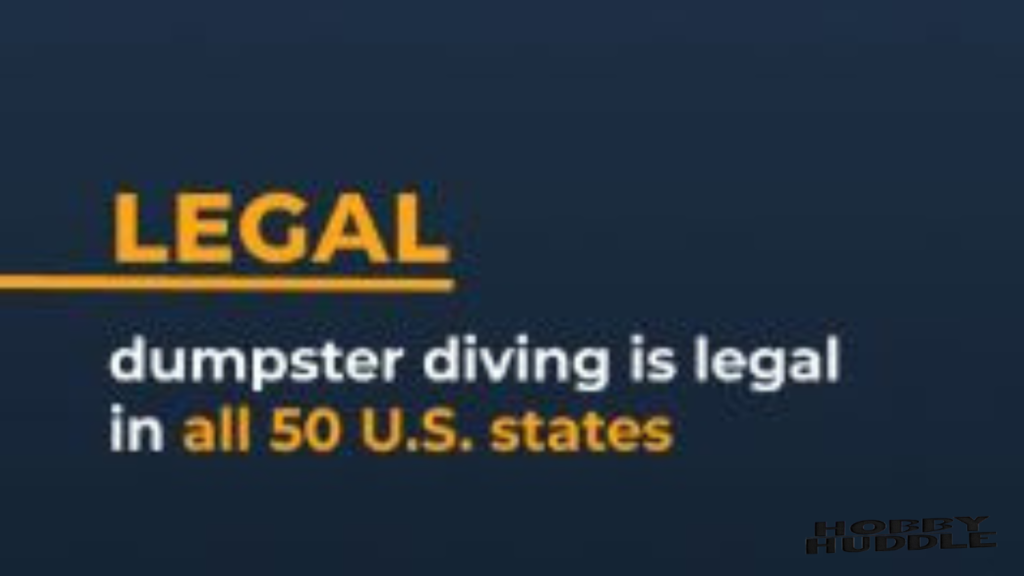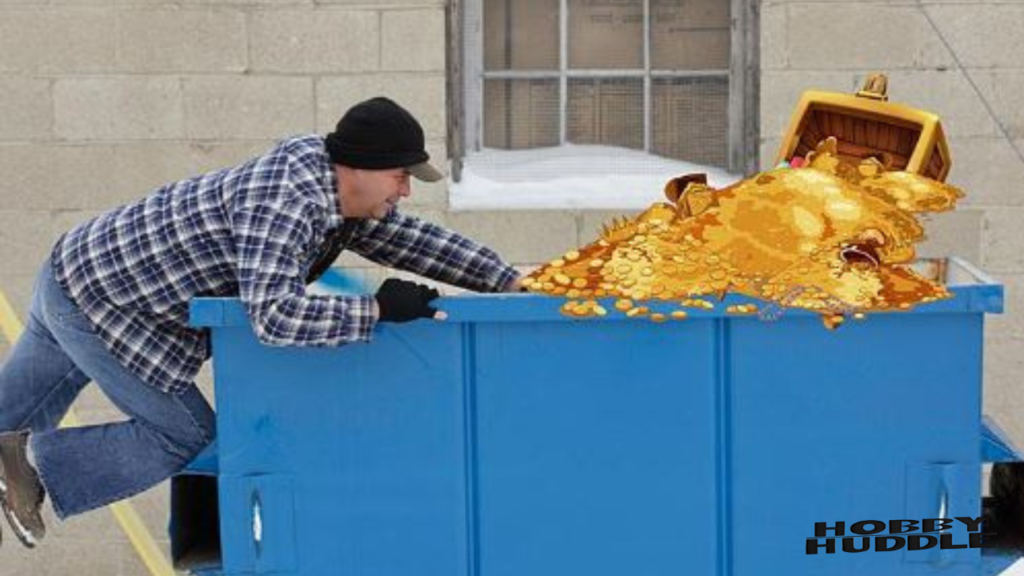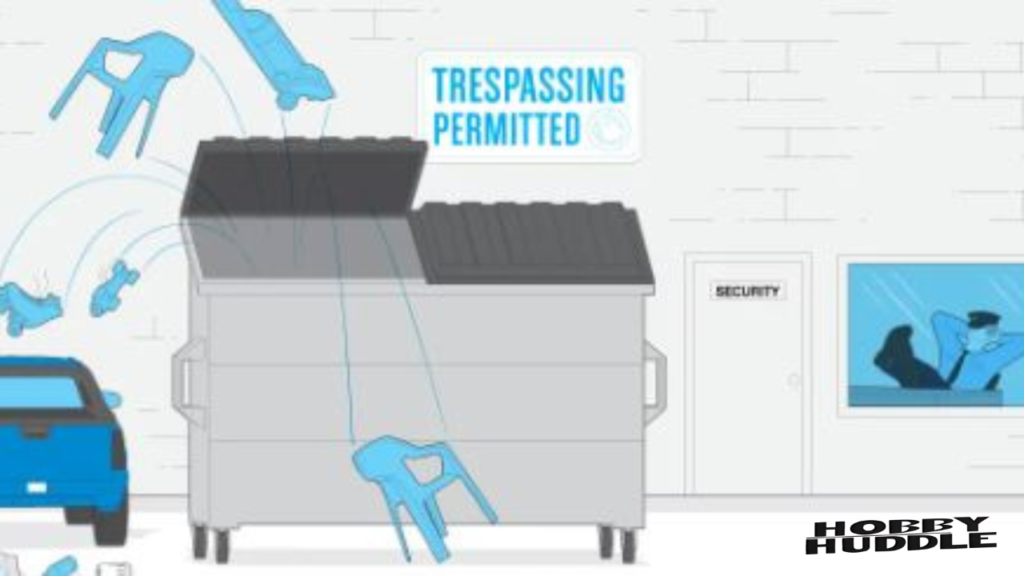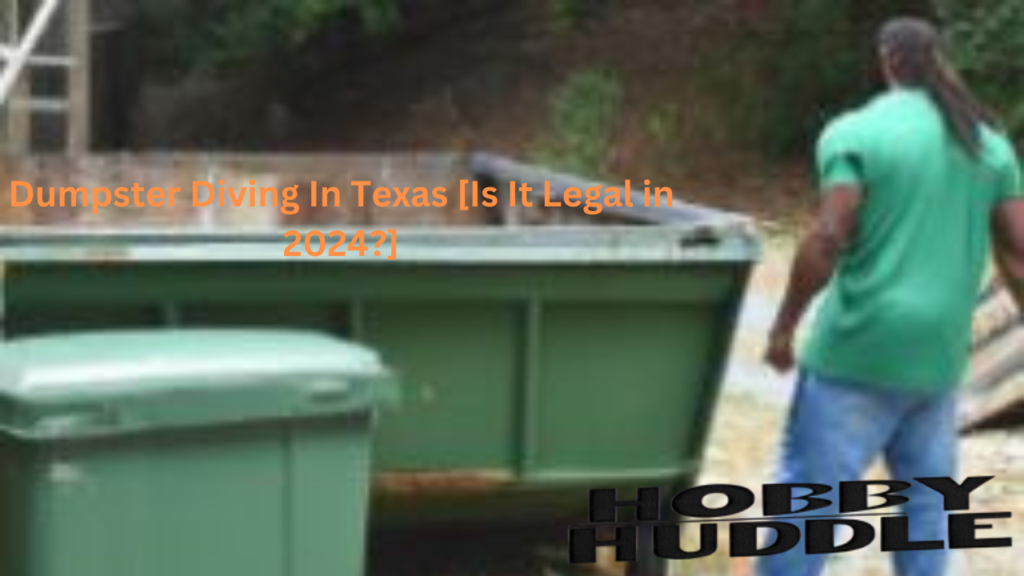Introduction: The Treasure Hunter’s Guide to Texas Trash
In the heart of the Lone Star State, a peculiar practice is gaining traction. It’s not oil drilling or cattle ranching, but something far more unexpected: dumpster diving. This unconventional hobby has Texans from Dallas to Austin, and Houston to El Paso, donning gloves and peeking into commercial dumpsters in search of hidden treasures.
Dumpster diving, at its core, is the act of sifting through commercial, residential, or industrial dumpsters to find usable goods that have been discarded. It’s a practice that’s part urban exploration, part treasure hunt, and part eco-warrior mission. In Texas, where the motto is “everything’s bigger,” even the trash holds grand possibilities.
But why is this quirky pastime gaining such popularity in the land of BBQ and rodeos? Well, partner, let me tell you:
- Economic factors: With rising living costs, many Texans are looking for creative ways to save or make money.
- Environmental concerns: As awareness of waste and sustainability grows, more folks are trying to rescue usable items from landfills.
- Thrill of the hunt: There’s an undeniable excitement in never knowing what you might find.
- Community building: Believe it or not, there’s a whole subculture of divers who share tips, stories, and finds.
As we dive deeper into this topic (pun absolutely intended), we’ll explore the legal landscape, best practices, prime picking spots, and even how to turn trash into cash. So grab your ten-gallon hat and let’s embark on this uniquely Texan treasure hunt!
You Might Like: Dumpster Diving In Indiana [Is It Legal in 2024?]
The Legal Landscape: Navigating Texas Dumpster Diving Laws
Before you start rummaging through the nearest dumpster, it’s crucial to understand the legal lay of the land. Dumpster diving in Texas isn’t as straightforward as you might think, and the last thing you want is to end up in hot water with local law enforcement.

State-wide Regulations
At the state level, Texas doesn’t have any specific laws that explicitly prohibit or permit dumpster diving. This legal gray area means that the practice isn’t outright illegal, but it’s not exactly given the green light either. The legality often boils down to local ordinances and property laws.
Here’s a quick breakdown of relevant state laws that could impact dumpster diving:
| Law | Description | Relevance to Dumpster Diving |
|---|---|---|
| Trespass Law | Entering private property without permission | Could apply if diving in private dumpsters |
| Theft Law | Taking property without owner’s consent | Might apply if items are considered not abandoned |
| Littering Law | Leaving trash in public places | Could be cited if divers make a mess |
| Health Codes | Regulations on handling food waste | May impact diving in restaurant dumpsters |
| Privacy Laws | Protection of personal information | Relevant if finding documents with sensitive info |
| Abandoned Property Laws | Rules on claiming discarded items | Can determine if taking items is legal |
| Loitering Laws | Restrictions on lingering in public areas | Might be used to discourage persistent divers |
| Disorderly Conduct | Disturbing the peace or public order | Could be cited for noisy or disruptive diving |
Local Ordinances to Watch Out For
While state laws provide a framework, it’s the local ordinances that often have the most direct impact on dumpster divers. These can vary widely from city to city, so it’s essential to do your homework before diving in any new area.
For example:
- In Austin, there’s no specific ordinance against dumpster diving, but disturbing the peace or trespassing laws could be applied.
- Houston has stricter regulations, with some areas explicitly prohibiting “scavenging” in their municipal codes.
- Dallas falls somewhere in the middle, with laws that don’t directly address dumpster diving but could be interpreted to restrict it in certain circumstances.
Private Property vs. Public Property: Know the Difference
One of the most critical legal distinctions for dumpster divers is understanding the difference between public and private property. This can often be the deciding factor in whether your diving expedition is legal or not.

Private Property:
- Most commercial dumpsters are on private property.
- Diving here without permission could be considered trespassing.
- Even if the dumpster is accessible from a public area, it may still be private property.
Public Property:
- Includes areas like parks, streets, and some government buildings.
- Dumpsters in these areas might be more legally accessible, but local ordinances still apply.
- Be aware that even on public property, dumpster diving might be restricted or prohibited.
“The key to legal dumpster diving is respect – for property, for the law, and for the community.” – Anonymous Texas Diver
Remember, even if dumpster diving isn’t explicitly illegal, other laws like trespassing, theft, or disturbing the peace could still land you in trouble. When in doubt, it’s always best to ask permission or consult with local authorities.
You Might Like: Rockhounding in Washington [The Ultimate Guide for 2024]
Daytime Dives vs. Midnight Missions
Now that we’ve covered the legal basics, let’s talk about timing. Is nighttime dumpster diving illegal in Texas? Well, it’s complicated.
Is Nighttime Dumpster Diving Illegal in Texas?
Strictly speaking, there’s no Texas law that specifically outlaws dumpster diving at night. However, nighttime activities often attract more suspicion, which could lead to run-ins with law enforcement or property owners.
Here’s why night diving might be riskier:
- Increased likelihood of trespassing charges
- Higher chance of being mistaken for a burglar
- More difficult to see “No Trespassing” signs or property boundaries
- Potential violation of local curfew laws in some areas
Pros and Cons of Diving After Dark
Like any good Texan poker player, you’ve got to weigh your odds. Let’s break down the pros and cons of nighttime dumpster diving:
| Pros | Cons |
|---|---|
| Less competition from other divers | Increased risk of legal trouble |
| More privacy and discretion | Harder to see what you’re picking up |
| Cooler temperatures (important in Texas heat!) | More likely to startle or be startled by others |
| Fresh discards from businesses closing | Some dumpsters may be locked at night |
| Less traffic and fewer pedestrians | Potential safety risks in unfamiliar areas |
| More likely to find intact items | Difficulty distinguishing valuable items |
| Avoid judgmental looks from passersby | May miss daytime-only dumpster access |
| Potentially more relaxed atmosphere | Could disturb nearby residents |
Safety Tips for Nocturnal Treasure Hunters
If you do decide to embark on a midnight mission, here are some essential safety tips:

- Buddy system: Never dive alone at night. Have a friend watch your back.
- Visibility: Wear reflective clothing and bring a good flashlight.
- Quick exit strategy: Always know how to get out of the area quickly if needed.
- Stay alert: Be aware of your surroundings at all times.
- Respect noise levels: Keep quiet to avoid disturbing nearby residents or businesses.
- Know the area: Familiarize yourself with the location during daylight hours first.
- Communicate: Let someone know where you’re going and when you’ll be back.
Remember, whether you’re diving by day or night, the golden rule is to leave the area cleaner than you found it. This not only helps maintain good relationships with property owners but also ensures the sustainability of dumpster diving for everyone.
You Might Like: Gold Panning in Pennsylvania [A Gold Prospecting Guide for 2024]
Prime Picking Spots: Where to Strike Gold in Texas
Now that we’ve covered the when and how of dumpster diving in Texas, let’s talk about the where. The Lone Star State is vast, and so are its dumpster diving opportunities. From the bustling streets of Houston to the quirky corners of Austin, there’s treasure to be found if you know where to look.
Retail Revelations: Big Box Stores and Strip Malls
Big box stores and strip malls are often gold mines for dumpster divers. These commercial hubs regularly discard a wide variety of items, from electronics to furniture, often in good condition.

Best Practices for Retail Dives:
- Check end-of-season clearance times
- Look for stores undergoing renovations
- Be aware of store policies on damaged goods
| Store Type | Common Finds | Best Time to Dive |
|---|---|---|
| Electronics Stores | Cables, small gadgets, packaging | After new product launches |
| Furniture Stores | Floor models, slightly damaged items | End of fiscal quarters |
| Bookstores | Books, magazines, promotional materials | After major holidays |
| Toy Stores | Seasonal items, discontinued products | Post-Christmas, end of summer |
| Office Supply Stores | Paper products, small office equipment | Back-to-school season end |
| Home Improvement Stores | Building materials, tools, paint | Spring cleaning season |
| Sporting Goods Stores | Out-of-season equipment, display items | Change of sports seasons |
| Pharmacies | Cosmetics, over-the-counter items | After planogram resets |
Food Finders: Grocery Stores and Farmers Markets
For those interested in reducing food waste, grocery stores and farmers markets can be treasure troves. However, it’s crucial to exercise caution and good judgment when it comes to food items.
Tips for Food Diving:
- Look for packaged items near their sell-by date
- Check for recalls before consuming any found food
- Be extra cautious with perishables like meat and dairy
“One man’s trash is another man’s treasure, but when it comes to food, always err on the side of caution.” – Texas Food Rescue Volunteer
Campus Treasures: Colleges and Universities
Texas is home to numerous colleges and universities, and these campuses can be goldmines for dumpster divers, especially during move-out seasons.
What to Look For on Campus:
- Textbooks and school supplies
- Furniture and dorm accessories
- Electronics and appliances
Best Times for Campus Diving:
- End of spring semester (May-June)
- End of summer sessions (August)
- Winter break (December-January)
Office Building Bonanzas
Office buildings, particularly in business districts of major Texas cities like Dallas and Houston, can yield surprising finds.
Common Office Dumpster Treasures:
- Office furniture
- Electronics (monitors, keyboards, etc.)
- Office supplies
Caution: Be extra careful about confidential documents or sensitive information. It’s illegal and unethical to take or use such materials.
You Might Like: 1965 Quarter Coin Value (Errors List & No Mint Mark Worth)
Restaurant Dumpsters: A Feast for the Frugal
Restaurant dumpsters can be tempting, but they require extra caution due to health and safety concerns.
What You Might Find:
- Unopened packaged foods
- Barely used kitchen equipment
- Decorative items
Restaurant Diving Safety:
- Avoid raw meats or easily spoiled items
- Be aware of local health codes
- Look for packaged items only
| Restaurant Type | Potential Finds | Diving Considerations |
|---|---|---|
| Fast Food Chains | Packaging, promotional items | High turnover, frequent disposal |
| Bakeries | Day-old baked goods | Early morning dives best |
| Cafes | Coffee grounds, pastries | Check for compost programs |
| Fine Dining | Wine bottles, decor items | More likely to have secured dumpsters |
| Food Trucks | Packaging, small equipment | Locations may vary frequently |
| Buffets | Large quantities of food waste | Higher risk of spoilage |
| Ethnic Restaurants | Unique packaging, spices | Cultural considerations important |
| Dessert Shops | Seasonal decorations, containers | Late night dives after closing |
Remember, regardless of where you choose to dive, always prioritize safety, legality, and respect for property and privacy. Happy hunting, y’all!
The Art of the Dive: Techniques and Tips
Alright, partners, now that we’ve covered where to find those Texas-sized treasures, let’s talk about how to dive like a pro. Dumpster diving isn’t just about jumping into the nearest trash bin; it’s an art form that requires skill, strategy, and a dash of Lone Star ingenuity.

Essential Gear for Texas Dumpster Divers
Before you saddle up for your dumpster diving adventure, make sure you’ve got the right gear. Here’s what every Texas trash treasure hunter should have in their arsenal:
- Sturdy gloves: Protect those hands from sharp objects and icky substances.
- Flashlight or headlamp: For those nighttime expeditions or peering into dark corners.
- Grabber tool: Extends your reach and keeps you from having to climb in.
- Sturdy shoes: No flip-flops, y’all. Protect those feet!
- Hand sanitizer: Keep those germs at bay.
- First aid kit: Safety first, always.
- Bags or containers: For carrying your newfound treasures.
- Moisture-wicking clothes: Texas heat is no joke, even when you’re dumpster diving.
Staying Safe and Sanitary
Now, let’s talk about keeping yourself safe and clean while you’re out there hunting for treasures.
Safety First:
- Never dive alone: Bring a buddy for safety and assistance.
- Watch for hazards: Be alert for broken glass, sharp metal, or other dangers.
- Don’t enter dumpsters: It’s dangerous and often illegal.
- Be aware of your surroundings: Stay alert for vehicles or suspicious activity.
Staying Clean:
- Use hand sanitizer frequently: Especially before touching your face or eating.
- Wash your hands thoroughly: As soon as you get home.
- Clean your finds: Sanitize or wash items before bringing them into your home.
- Shower after diving: It’s a good habit to get into.
“Cleanliness is next to godliness, especially when you’re elbow-deep in a dumpster.” – Anonymous Texas Diver
Etiquette: Don’t Be a Trashy Diver
Just because you’re diving in trash doesn’t mean you should act trashy. Here are some golden rules of dumpster diving etiquette:
- Leave no trace: Always leave the area cleaner than you found it.
- Respect property: Don’t break locks, climb fences, or enter clearly marked private areas.
- Be quiet: Especially if you’re diving at night in residential areas.
- Don’t take more than you need: Leave some for other divers.
- Be discreet: Don’t draw unnecessary attention to yourself or the dumpster.
- Respect “No Trespassing” signs: If you see one, move on to another location.
- Don’t argue with employees or security: If asked to leave, do so politely.
| Etiquette Do’s | Etiquette Don’ts |
|---|---|
| Ask permission when possible | Break locks or fences |
| Close dumpster lids when done | Make excessive noise |
| Sort through items carefully | Leave a mess behind |
| Share finds with other divers | Hoard more than you need |
| Respect store hours and policies | Argue with staff or security |
| Be prepared to explain yourself calmly | Dive in clearly marked private areas |
| Thank property owners who allow diving | Damage property while diving |
| Report any hazards you find | Sell items marked “not for resale” |
Remember, your behavior reflects on the entire dumpster diving community. By following these guidelines, you’ll help ensure that this practice remains viable and respected in the Lone Star State.
From Trash to Cash: The Economics of Dumpster Diving
Y’all ready to turn that Texas trash into treasure? Let’s talk about the economic side of dumpster diving. While some folks dive for the thrill or to reduce waste, others are in it for the potential profits. So, can you really make money from other people’s castoffs in the Lone Star State?
What Can You Realistically Expect to Find?
First things first, let’s set some realistic expectations. While you probably won’t stumble upon a chest of gold doubloons (though in Texas, who knows?), you can find some pretty valuable items if you know where to look.
Common Valuable Finds:
- Electronics: Laptops, smartphones, gaming consoles
- Furniture: Chairs, tables, bookshelves
- Appliances: Toasters, coffee makers, microwaves
- Books: Textbooks, rare editions, popular novels
- Clothing: Brand-name items, vintage pieces
- Home decor: Lamps, artwork, decorative items
- Tools: Power tools, hand tools, gardening equipment
Remember, the key is consistency. You might not strike it rich on every dive, but regular outings can lead to a steady stream of sellable items.
Selling Your Scores: Online Marketplaces and Local Options
Once you’ve got your Texas-sized haul, it’s time to turn those finds into cold, hard cash. Here are some popular options for selling your dumpster diving treasures:
Online Marketplaces:
- eBay: Great for unique or collectible items
- Facebook Marketplace: Ideal for local sales, especially furniture
- Craigslist: Another local option, popular in major Texas cities
- OfferUp: User-friendly app for quick local sales
- Poshmark: Perfect for clothing and accessories
Local Options:
- Flea markets: Popular in cities like Houston and San Antonio
- Consignment shops: Good for higher-end clothing and furniture
- Scrap yards: For metal and electronic components
- Local buy/sell/trade groups: Check Facebook for community groups
- Garage sales: A Texas tradition!
| Selling Method | Best For | Pros | Cons |
|---|---|---|---|
| eBay | Unique, collectible items | Large audience | Shipping hassles |
| Facebook Marketplace | Local, bulky items | Easy to use | Potential no-shows |
| Craigslist | Quick local sales | No fees | Safety concerns |
| Flea Markets | Variety of items | Cash sales | Time-consuming |
| Consignment Shops | High-end clothing, furniture | Professional sales help | Lower profit margin |
| Scrap Yards | Metals, electronics | Quick cash | Lower values |
| Garage Sales | Clearing out inventory | Community event | Weather dependent |
| Poshmark | Brand name clothing | Targeted audience | Platform fees |
Case Studies: Texas Divers Who’ve Struck It Rich
While we can’t guarantee you’ll become a millionaire from dumpster diving, some Texans have certainly made a pretty penny from their trash-to-treasure endeavors. Here are a few inspiring stories:
- Austin Tech Tycoon: A college student in Austin made over $10,000 in a year by focusing on tech company dumpsters, finding everything from prototype gadgets to high-end computer parts.
- Dallas Fashion Finder: A savvy diver in Dallas built a successful online vintage clothing store, sourcing most of her inventory from upscale retail dumpsters during seasonal changeovers.
- Houston’s Book Baron: A retired teacher in Houston paid off his mortgage by selling textbooks and rare books found in university and bookstore dumpsters.
- San Antonio Furniture Flipper: A carpenter turned his dumpster finds into a lucrative furniture restoration business, transforming discarded pieces into custom, high-end furniture.
“One man’s trash is another man’s treasure, but it takes a keen eye and some elbow grease to see the potential in what others throw away.” – Houston’s Book Baron
Environmental Impact: How Dumpster Diving Helps Texas
Now, let’s shift gears and talk about something near and dear to many Texans’ hearts: our beautiful Lone Star State environment. Dumpster diving isn’t just about finding treasures or making money; it’s also a way to reduce waste and promote sustainability.
Reducing Landfill Waste
Texas is big, but our landfills aren’t getting any bigger. Dumpster diving plays a crucial role in diverting usable items from ending up in these ever-growing trash heaps.
Landfill Facts:
- Texas has over 190 active landfills
- These landfills receive about 35 million tons of waste annually
- Many items in landfills could have been reused or recycled
How Dumpster Diving Helps:
- Rescues usable items from waste stream
- Extends the life of products
- Reduces demand for new products, saving resources
Exposing Corporate Waste Practices
Dumpster diving often shines a light on wasteful corporate practices, leading to positive changes in how businesses handle their excess inventory and returns.
Examples of Exposed Practices:
- Destroying unsold clothing to maintain brand exclusivity
- Discarding edible food due to aesthetic imperfections
- Trashing returned items instead of restocking or donating
Positive Outcomes:
- Increased donations to charities and food banks
- Implementation of more sustainable inventory practices
- Greater public awareness of waste issues
Building a More Sustainable Lone Star State
By participating in and promoting dumpster diving, Texans are contributing to a more sustainable future for our state.
Sustainability Benefits:
- Reduces need for raw materials
- Lowers energy consumption for new product manufacturing
- Decreases transportation emissions from new product distribution
- Promotes a circular economy mindset
| Sustainability Aspect | Impact of Dumpster Diving |
|---|---|
| Resource Conservation | Reduces demand for new raw materials |
| Energy Savings | Decreases energy used in manufacturing |
| Emissions Reduction | Lowers transportation and production emissions |
| Waste Reduction | Diverts usable items from landfills |
| Economic Benefits | Creates opportunities for resale and upcycling |
| Education | Raises awareness about waste and consumption |
| Community Building | Fosters sharing and resourcefulness |
| Corporate Responsibility | Encourages businesses to adopt better practices |
Legal Alternatives to Dumpster Diving
While dumpster diving can be an exciting way to find treasures and reduce waste, it’s not for everyone. Luckily, Texas offers plenty of legal alternatives that can satisfy your treasure hunting itch and your desire to live more sustainably.
Freecycle and Buy Nothing Groups
These community-based groups focus on giving away unwanted items for free, rather than throwing them away.
How It Works:
- Join local Freecycle or Buy Nothing Facebook groups
- Post items you want to give away
- Claim items others are giving away
- Arrange pickup or drop-off
Benefits:
- Completely legal and above-board
- Build community connections
- No need to rummage through dumpsters
Food Rescue Organizations in Texas
These organizations focus on rescuing edible food that would otherwise be wasted and distributing it to those in need.
Notable Texas Food Rescue Organizations:
- Central Texas Food Bank (Austin)
- North Texas Food Bank (Dallas)
- Houston Food Bank
- San Antonio Food Bank
How to Get Involved:
- Volunteer for food rescue missions
- Donate excess food from your business
- Support these organizations financially
Thrift Stores and Yard Sales: The Legal Diver’s Paradise
Thrift stores and yard sales are treasure troves for bargain hunters and upcyclers alike.
Best Practices:
- Visit thrift stores regularly for the best finds
- Check local listings for yard sales and estate sales
- Negotiate prices politely
- Consider bulk purchases for resale
Popular Texas Thrift Store Chains:
- Goodwill
- Salvation Army
- Texas Thrift
- Family Thrift Center
| Alternative | Pros | Cons | Best For |
|---|---|---|---|
| Freecycle/Buy Nothing | Free, community-building | Limited selection, first-come-first-served | Furniture, household items |
| Food Rescue Orgs | Helps community, reduces food waste | Requires time commitment | Those passionate about food waste |
| Thrift Stores | Wide selection, supports charities | Costs money, can be picked over | Clothing, books, household items |
| Yard Sales | Potential for great bargains | Time-consuming, hit-or-miss | Variety hunters, early birds |
The Future of Dumpster Diving in Texas
As we look ahead, what does the future hold for dumpster diving in the Lone Star State? Let’s dust off our crystal ball and take a peek.
Changing Attitudes and Policies
Public perception of dumpster diving is evolving, and with it, policies are starting to shift.
Trends to Watch:
- More businesses adopting “zero waste” policies
- Increased focus on donation over disposal
- Growing acceptance of “freegan” lifestyles
- Potential for more formalized “gleaning” programs
Technology’s Impact on the Practice
Technology is changing the dumpster diving landscape in surprising ways.
Technological Influences:
- Apps connecting divers with businesses to reduce waste
- Social media groups for sharing diving spots and finds
- GPS tracking of trash trucks and dumpster locations
- Increased use of compactors and locked dumpsters
Will Dumpster Diving Become Mainstream?
As sustainability becomes more crucial, could dumpster diving lose its fringe status?
Factors to Consider:
- Growing environmental consciousness
- Increasing cost of living pushing more to alternative sources
- Potential for regulation and formalization of the practice
- Corporate pushback and liability concerns
“The future of dumpster diving in Texas isn’t just about finding treasures in trash. It’s about reshaping our relationship with waste and consumption.” – Texas Environmental Activist
Conclusion: Is Dumpster Diving Right for You?
As we wrap up our deep dive into the world of Texas dumpster diving, it’s time to ask yourself: is this practice right for you?
Weighing the Risks and Rewards
Potential Rewards:
- Free goods and potential profits
- Reduced environmental impact
- Thrill of the hunt
- Community connections
Possible Risks:
- Legal issues
- Safety concerns
- Social stigma
- Time investment
Resources for Aspiring Texas Trash Treasurers
If you’re ready to take the plunge, here are some resources to get you started:
- Local dumpster diving Facebook groups: Connect with experienced divers in your area
- Waste Management websites: Understand local regulations and pickup schedules
- Environmental organizations: Learn more about waste reduction efforts in Texas
- Local police departments: Clarify laws and best practices in your city
Remember, whether you decide to don your diving gear or stick to more conventional methods of treasure hunting, the key is to approach consumption and waste with mindfulness and respect for our great state of Texas.
So, are you ready to see the hidden value in what others discard? The dumpsters of Texas await, full of potential treasures and the promise of a more sustainable future. Happy diving, y’all!

Emma Garcia is a seasoned blogger at Hobby Huddle, where her passion for exploring diverse hobbies shines through her engaging posts. With years of experience in writing and a keen eye for detail, Emma brings readers insightful tips and fresh perspectives on everything from crafts to cooking. Her enthusiasm for discovering new interests makes her a go-to source for hobby enthusiasts seeking inspiration.







